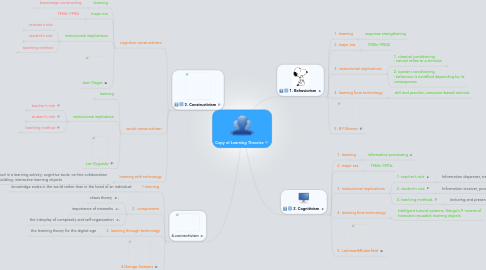
1. 3. Constructivism
1.1. cognitive constructivism
1.1.1. learning
1.1.1.1. knowledge constructing
1.1.1.1.1. knowledge cannot be "transferred" but "constructed"
1.1.1.1.2. emphasis on individual difference
1.1.2. major era
1.1.2.1. 1980s-1990s
1.1.3. instructional implications
1.1.3.1. teacher's role
1.1.3.1.1. Guide/facilitator of academic tasks
1.1.3.2. student's role
1.1.3.2.1. Sense maker
1.1.3.3. teaching method
1.1.3.3.1. Learning is an active process
1.1.4. Jean Piaget
1.2. social constructivism
1.2.1. learning
1.2.1.1. evolved from cognitive constructivism
1.2.1.2. learning is a collaborative process
1.2.1.3. the definitional and research bases not yet fully developed
1.2.2. instructional implication
1.2.2.1. teacher's role
1.2.2.1.1. guide for exploring academic tasks
1.2.2.2. student's role
1.2.2.2.1. sense maker
1.2.2.3. teaching method
1.2.2.3.1. discuss; guided discovery; supervised participation in academic tasks
1.2.3. Lev Vygotsky
1.3. learning with technoogy
1.3.1. technology as a tool in a learning activity; cognitive tools; on-line collaboration and knowledge building; interactive learning objects
2. 4.connectivism
2.1. 1.learning
2.1.1. knowledge exists in the world rather than in the head of an individual
2.2. 2 . components
2.2.1. chaos theory
2.2.2. importance of networks
2.2.3. the interplay of complexity and self-organization
2.3. 3. learning through technology
2.3.1. the learning theory for the digital age
2.4. 4.George Siemens
3. 1. Behaviorism
3.1. 1. learning
3.1.1. response strengthening
3.2. 2. major era
3.2.1. 1900s-19502
3.3. 3. instructional implications
3.3.1. 1. classical conditioning - natural reflex to a stimulus
3.3.1.1. 1. teacher's role
3.3.1.1.1. dispenser of rewards and punishments
3.3.1.2. 2. student's role
3.3.1.2.1. - recipient of rewards and punishment - learners are passive recipients of eonvironmental stimuli
3.3.1.3. 3. teaching methods
3.3.1.3.1. drill and practice on basic skills
3.3.2. 2. operant conditioning - behaviour is modified depending by its consequence
3.4. 4. learning from technology
3.4.1. drill and practice; computer-based tutorials
3.5. 5. B.F.Skinner
4. 2. Cognitivism
4.1. 1. learning
4.1.1. information processing
4.2. 2. major era
4.2.1. 1960s-1970s
4.3. 3. instructional implications
4.3.1. 1. teacher's role
4.3.1.1. Information dispenser, transmitter
4.3.2. 2. student's role
4.3.2.1. Information receiver, processor
4.3.3. 3. teaching methods
4.3.3.1. lecturing and presenting of textbooks
4.4. 4. learning from technology
4.4.1. intelligent tutorial systems; Gange's 9 -events of instruction;reusable learning objects
